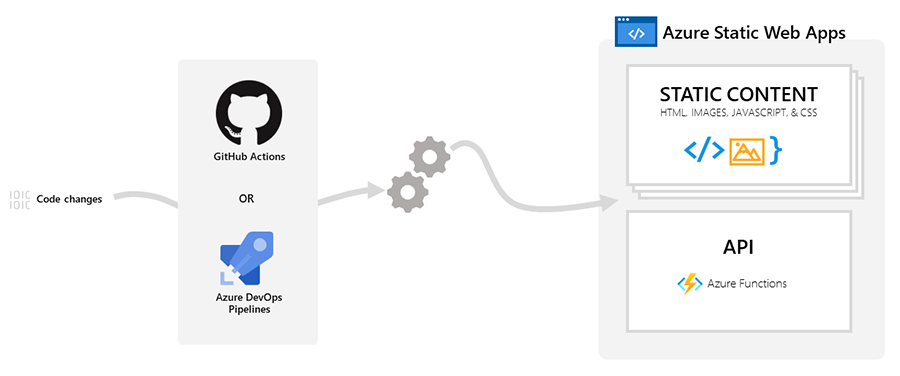What is Azure Static Web Apps?
Azure Static Web Apps is a service that automatically deploys full stack web apps to Azure from a code repository.

The workflow of Azure Static Web Apps is tailored to a developer's daily workflow. Apps are built and deployed based on code changes.
When you create an static web app, Azure interacts directly with GitHub or Azure DevOps to monitor a branch of your choice. Every time you push commits or accept pull requests into the watched branch, a build automatically runs and your app and API deploys to Azure.
Static web apps are commonly built using libraries and web frameworks like Angular, React, Svelte, Vue, or Blazor where server side rendering isn't required. These apps include HTML, CSS, JavaScript, and image assets that make up the application. With a traditional web server, these assets are served from a single server alongside any required API endpoints.
With Static Web Apps, static assets are separated from a traditional web server and are instead served from points geographically distributed around the world. This distribution makes serving files much faster as files are physically closer to end users. In addition, API endpoints are hosted using a serverless architecture, which avoids the need for a full back-end server altogether.
Key features
- Web hosting for static content like HTML, CSS, JavaScript, and images.
- Integrated API support provided by managed Azure Functions, with the option to link an existing function app, web app, container app, or API Management instance using a standard account. If you need your API in a region that doesn't support managed functions, you can bring your own functions to your app.
- First-class GitHub and Azure DevOps integration that allows repository changes to trigger builds and deployments.
- Globally distributed static content, putting content closer to your users.
- Free SSL certificates, which are automatically renewed.
- Custom domains to provide branded customizations to your app.
- Seamless security model with a reverse-proxy when calling APIs, which requires no CORS configuration.
- Authentication provider integrations with Microsoft Entra ID and GitHub.
- Customizable authorization role definition and assignments.
- Back-end routing rules enabling full control over the content and routes you serve.
- Generated staging versions powered by pull requests enabling preview versions of your site before publishing.
- CLI support through the Azure CLI to create cloud resources, and via the Azure Static Web Apps CLI for local development.
What you can do with Static Web Apps
- Build modern web applications with JavaScript frameworks and libraries like Angular, React, Svelte, Vue, or using Blazor to create WebAssembly applications, with an Azure Functions back-end.
- Publish static sites with frameworks like Gatsby, Hugo, VuePress.
- Deploy web applications with frameworks like Next.js and Nuxt.js.